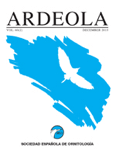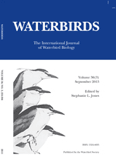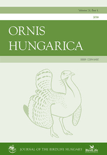
ORNIS FENNICA
Scope & Guideline
Elevating the Study of Birds through Innovative Research
Introduction
Aims and Scopes
- Ecology and Behavior of Birds:
The journal emphasizes studies that explore the ecological roles and behavioral patterns of birds, including foraging, migration, and territoriality. - Conservation Biology:
ORNIS FENNICA publishes research that addresses conservation issues, including population dynamics, habitat preferences, and the impact of human activities on bird species. - Avian Physiology and Reproductive Success:
Research on physiological adaptations, reproductive strategies, and survival rates of bird populations is a significant focus, providing insights into their life cycles and environmental responses. - Impact of Climate Change on Avian Populations:
The journal includes studies that examine how climate change affects bird migration patterns, breeding timings, and habitat distribution. - Human-Wildlife Interactions:
Research related to the interactions between birds and human activities, such as urbanization, agricultural practices, and wildlife management, is also a core area of interest.
Trending and Emerging
- Technological Applications in Avian Research:
The use of drones, GPS tracking, and automated counting methods is on the rise, showcasing a trend towards incorporating technology for enhanced data collection and analysis. - Climate Change Adaptation Strategies:
Research addressing how birds adapt to climate change, including shifts in migration patterns and breeding timings, is increasingly prevalent, reflecting global concerns about environmental changes. - Behavioral Ecology and Social Interactions:
There is a growing emphasis on understanding the social structures and behavioral adaptations of birds, particularly in relation to environmental pressures and resource availability. - Impact Assessments of Human Activities:
Studies assessing the impacts of urbanization, land-use changes, and agricultural practices on avian populations are becoming more common, highlighting the need for effective management strategies. - Conservation Genetics:
The integration of genetic tools in conservation studies to understand population dynamics and genetic diversity is emerging as a significant area of research in the journal.
Declining or Waning
- Artificial Nesting and Box Studies:
Research focused on the use of artificial nesting structures has decreased, possibly due to a shift towards studying natural habitats and behaviors in situ. - Traditional Birdwatching and Observation Studies:
Studies primarily based on observational data without robust analytical frameworks or experimental designs appear to be waning, as the field moves towards more quantitative and experimental approaches. - General Habitat Descriptions:
Papers that merely describe habitats without exploring specific ecological questions or management implications are less common, indicating a move towards more applied research. - Static Population Assessments:
There has been a reduction in studies that only assess bird populations at a single point in time, as the journal increasingly favors longitudinal studies that track changes over time.
Similar Journals

Ardeola-International Journal of Ornithology
Connecting Ornithologists Through Insightful StudiesArdeola - International Journal of Ornithology, published by the SOCIEDAD ESPAÑOLA DE ORNITOLOGÍA, serves as a vital platform for the dissemination of research in the field of avian studies. With a history dating back to 1980, this esteemed journal has cultivated a reputation for high-quality research, achieving a notable Q2 category ranking in Animal Science and Zoology as well as in Ecology, Evolution, Behavior, and Systematics as of 2023. While primarily based in Spain, Ardeola caters to a global audience, providing essential insights into ornithology through rigorously peer-reviewed articles. The journal does not currently operate under an open-access model, which underscores the significance of institutional subscriptions and the importance of supporting academic publishing. Researchers, professionals, and students engaged in avian ecology will find Ardeola indispensable for accessing impactful studies that advance our understanding of bird populations, behaviors, and conservation issues. With its accessibility and continuing commitment to excellence, Ardeola plays a crucial role in fostering knowledge and promoting dialogue in the ornithological community.

Avian Conservation and Ecology
Innovating solutions for avian population resilience.Avian Conservation and Ecology, published by the Resilience Alliance, is a premier open-access journal dedicated to advancing the scientific understanding and management of avian populations and their ecosystems. With an ISSN of 1712-6568, this journal has been a vital resource since its inception in 2005, ensuring that research findings are readily accessible to the global community. Based in Canada, it covers a diverse array of topics within the realms of Animal Science, Zoology, Ecology, and Conservation. Recognized for its rigor, it boasts a distinguished Q1 ranking in Animal Science and Zoology, and maintains respectable positions in various ecological categories as of 2023. Researchers and students alike will find valuable insights and innovative studies that address key conservation challenges, reflecting the journal's commitment to fostering ecological resilience and informing policy-making. As a platform that champions open access, Avian Conservation and Ecology plays a crucial role in enhancing collaboration and communication among scientists, policy-makers, and the public。

Birds
Bridging disciplines for a deeper understanding of birds.Birds, published by MDPI, serves as a pivotal platform for scholarly exchange in the fields of Animal Science, Zoology, and Ecology. With its publication journey from 2020 to 2024, the journal notably holds a Q2 ranking in both the Animal Science and Zoology, and Ecology, Evolution, Behavior and Systematics categories for 2023, indicating its growing influence and relevance in these critical areas of study. Hailing from Switzerland, Birds is committed to advancing understanding of avian biology and ecology, offering timely research findings and fostering interdisciplinary collaboration. The journal features an Open Access model, allowing unimpeded access to high-quality research and facilitating greater dissemination of knowledge. Aspiring researchers, seasoned professionals, and students alike will find a wealth of insights and innovative approaches within its pages, contributing significantly to the conservation and appreciation of bird species worldwide.

WATERBIRDS
Unlocking the Secrets of Waterbird EcologyWATERBIRDS, published by the WATERBIRD SOC, serves as a vital scholarly resource in the field of Animal Science and Zoology. With its ISSN 1524-4695 and E-ISSN 1938-5390, this journal has established a significant presence since its inception in 1996, continuing to contribute valuable insights and research up to 2024. Recognized for its impact within the academic community, WATERBIRDS is currently positioned in the third quartile (Q3) for its category in 2023, ranking 335 out of 490 in Scopus's Agricultural and Biological Sciences sector, which underscores its role in promoting the study of avian species and their habitats. The journal is accessible to a wider audience, aligning with the growing demand for open access to scientific knowledge. By disseminating research that addresses both ecological and conservation issues pertinent to waterbirds, this publication serves as an essential platform for researchers, professionals, and students dedicated to advancing the understanding of avian biology and related fields.

ORNIS HUNGARICA
Championing high-quality research in animal sciences.ORNIS HUNGARICA, an esteemed journal in the fields of Animal Science and Zoology as well as Ecology, Evolution, Behavior and Systematics, is published by Walter de Gruyter GmbH, a leading scientific publisher renowned for its commitment to disseminating high-quality research. Operating under an Open Access model since 2012, this journal provides invaluable access to scholarly articles, fostering collaboration and knowledge sharing among researchers and professionals. With its ISSN 1215-1610 and E-ISSN 2061-9588, ORNIS HUNGARICA has become a noteworthy platform for innovative studies and findings from Hungary and beyond, contributing significantly to the discourse in its field. As indicated by its Q3 ranking in Animal Science and Zoology and Q4 ranking in Ecology, the journal is recognized for its diverse research contributions, although it aims to expand its reach and relevance in future editions. Researchers and students alike will find in ORNIS HUNGARICA a dedicated resource for advancing knowledge and furthering the understanding of avian biology and ecology.

RUSSIAN JOURNAL OF HERPETOLOGY
Connecting Research and Conservation in HerpetologyRUSSIAN JOURNAL OF HERPETOLOGY is a prominent scholarly publication dedicated to the field of herpetology, focusing on the study of reptiles and amphibians. Published by FOLIUM PUBL CO in the Russian Federation, this journal aims to foster the exchange of knowledge and research in animal science, ecology, evolution, and behavior. With its ISSN 1026-2296 and a significant commitment to high-quality academic discourse, the journal maintains a respectable standing within the Q3 quartile in both Animal Science and Zoology, as well as in Ecology, Evolution, Behavior, and Systematics. This attributes to its Scopus rank among leading journals in related fields, enhancing its visibility and influence. Spanning from 2014 through 2024, it publishes rigorous research that explores the diversity, biology, and conservation of herpetofauna, making it a vital resource for researchers, professionals, and students alike who are invested in the ecological and evolutionary dynamics of these species.

AUSTRALIAN JOURNAL OF ZOOLOGY
Exploring the Rich Tapestry of Animal LifeAustralian Journal of Zoology, published by CSIRO PUBLISHING, serves as a premier platform for research in the fields of animal science and zoology, with a profound commitment to advancing our understanding of wildlife and ecosystems. Featuring an ISSN of 0004-959X and an E-ISSN of 1446-5698, this esteemed journal encompasses a wide range of topics relevant to ecology, evolution, behavior, and systematics. For the year 2023, it holds a commendable Q2 ranking in both Animal Science and Zoology and Ecology, Evolution, Behavior, and Systematics, demonstrating its significant impact within the academic community. With a rich publication history spanning from 1952 to 2024, the journal caters to researchers, professionals, and students by disseminating crucial findings and methodologies that contribute to effective conservation efforts and informed ecological practices. Although not an open access journal, it continues to foster collaboration and discussion among scholars in Australia and beyond. Located in Clayton, Victoria, the journal remains dedicated to its objective of enhancing knowledge in zoological sciences and addressing vital environmental challenges.

JOURNAL OF ORNITHOLOGY
Documenting the Diversity of Bird SpeciesJOURNAL OF ORNITHOLOGY, published by Springer Heidelberg, is a leading international journal dedicated to the study of birds and their conservation. With an ISSN of 2193-7192 and an E-ISSN of 2193-7206, this journal serves as a crucial platform for disseminating innovative research focused on avian biology, ecology, and behavior, making significant contributions to the fields of Agricultural and Biological Sciences and Animal Science and Zoology, where it holds a commendable rank of #156 out of 490 in Scopus. Established from 2004 and continuing through 2024, the journal strives not only to advance academic scholarship but also to inform practical conservation efforts globally. While currently not open access, it remains a vital resource for researchers, professionals, and students seeking high-quality studies and findings that influence the understanding and preservation of bird species. The journal's commitment to excellence in science highlights its importance in ornithological research, offering insights that are both profound and actionable.

Avian Biology Research
Connecting researchers to the pulse of avian biology.Avian Biology Research, published by SAGE PUBLICATIONS LTD, is a leading journal dedicated to advancing the study of avian species through high-quality, peer-reviewed research. With an ISSN of 1758-1559 and an E-ISSN of 1758-1567, this journal has established itself as a vital resource within the fields of Animal Science and Zoology, as well as Ecology, Evolution, Behavior, and Systematics. The journal is currently ranked Q3 in both categories according to the 2023 release of the category quartiles, and it contributes significantly to the global understanding of avian biology, including behavior, physiology, and conservation efforts. Positioned within the competitive landscape of the Scopus rankings, it finds itself amidst a diverse array of research, with medical and environmental implications. As an open-access journal, Avian Biology Research ensures greater accessibility to its contents, fostering disseminative opportunities for researchers, professionals, and students alike. With a publication window spanning from 2008 to 2024, it continues to be an invaluable platform for the dissemination and dialogue of avian research, thereby enlightening future inquiries and driving scientific advancements in this crucial area of biology.

MALIMBUS
Unveiling the mysteries of bird migration and habitats.MALIMBUS is a peer-reviewed journal published by the West African Ornithological Society, focusing on the study of avian biology and conservation. It aims to disseminate important research findings that contribute to the understanding of bird species, their habitats, and the challenges they face across West Africa and beyond. Although currently not available in an open-access format, the journal is an invaluable resource for ornithologists, ecologists, and industry professionals keen on advancing their understanding of avian science. Those engaged in research on bird migration, breeding behaviors, and conservation strategies will find MALIMBUS to be a vital platform for sharing innovative ideas and fostering collaborations. With its commitment to quality and rigorous review processes, MALIMBUS is an essential reference for anyone dedicated to studying and preserving avian diversity.